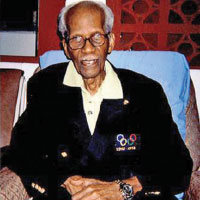media_artricles :: 2013
‘Mac’ Bailey, world class athlete
Basil A Ince :: Trinidad Express :: 06.12.2013Emmanuel McDonald Bailey was our first great sprinter to hit the world stage and he held his own with the best of his time. Among them were the Americans, Harrison Dillard and Lindy Remigino, and the Jamaicans, Herb McKenley and Lloyd La Beach. All these men were either gold medallists or medallists at the Olympic Games. Mac, as he was popularly called, was a fixture in the world rankings in the late 1940s and early 1950s, ranking first in the 200m and 2nd in the 100m both in 1951. He was the Dean of Trinidad and Tobago’s sprinters and, when he campaigned in Europe, he was as popular as our great cricketer, Learie Constantine. Mac died at the age of 93 on Wednesday.
I first met Mac at the Globe Cinema at the corner of Park and St Vincent Streets in 1948. It was not in person. He was on the silver screen in the Movietone News that preceded the main menu, and I was comfortably ensconced in a seat not far from the screen. There he was dashing across the screen in a form so smooth that it was later described as poetry in motion. But his reception was accompanied by hisses when it was reported that he was going to represent Britain.
It is ironic that McDonald Bailey, who was the first to put Trinidad and Tobago’s name on the sprinting firmament, never represented Trinidad and Tobago at the biggest athletic extravaganza on the world stage—the Olympic Games. At the end of the 1947 athletic season, Mac had pulled a thigh muscle and was barely able to recover for the Olympics. Local officials hearing of his injury, counted him out of contention for the Games. In fact, he was never selected, and he accepted an invitation to represent Britain. Although not in top form, he ran what he considered his best race ever finishing sixth in the six-man final.
Bailey became the first Trinbagonian sprinter to win an Olympic medal—a bronze in 1952. There were other firsts: the first Trinbagonian to reach an Olympic final (sixth in 1948); the only Trinbagonian to hold a world record in the 100m, a feat he accomplished in 1951 in Belgrade, Yugoslavia when he ran 10.2; the first Trinbagonian to be ranked first in the world in the 200m (1951); the first Trinbagonian to reach Olympic sprint finals (100m and 200m) at the same Olympics (1952); the first Trinbagonian to reach consecutive Olympic finals in the 100m (1948 and 1952); and the only Trinbagonian to appear in the Guinness Book of Records as the individual winning the most athletic titles. He scored doubles in the 100 yards and 220 yards from 1946 to 1953 (except 1948) at the British AAA Championships.
McDonald Bailey was born in Hardbargain, Williamsville on December 8, 1920 and began his running at school in Princes Town where his father was headmaster. He continued at Arima Boys’ Government School before he moved to Tranquillity Boys’ Intermediate. That was his penultimate step before moving on to Queens Royal College where he emerged as Junior Victor Ludorum winner.
At QRC the exploits of Jesse Owens fascinated Mac and it was there he made the decision to carve out a career in running. Between 1940 and 1944 he campaigned in Trinidad and Tobago and the Caribbean and there were two highlights in his career before he went abroad. He became the first local sprinter to beat JRN Cumberbatch in the 220 yards and later travelled to Jamaica in 1942 to beat Herb McKenley in 100 yards at the Jamaica AAA Championships.
Today athletes wishing to pursue their track careers usually head to US campuses, a trend started by Michael Agostini in the mid 50s. In 1944, however, Mac headed to Britain where he joined the Royal Air Force (RAF). It was in Britain that he started his accumulation of double wins at the British Championships that would eventually land him in the Guinness Book of Records. He represented Trinidad and Tobago at the CAC Games in 1946 when he journeyed to Barranquilla, Colombia, and finished in third place behind the Cuban, Rafael Fortun and Herb Mckenley. Georgie Lewis, a national sprint champion, was on that team as was weightlifter, Rodney Wilkes, who was to win silver at the Olympics two years later in London.
McDonald Bailey, known in his heyday as the Brown Bullet, left a platform from which the likes of Hasely Crawford and Ato Boldon catapulted to world stardom. In fact, Bailey laid a foundation for all national sprinters. Bailey, a family man, leaves to mourn his wife Doris, five children, ten grandchildren, and seven great grandchiIdren. I extend my condolences to his family. May his soul rest in peace.
Dr Ince is the author of Olympian: 75 Years of Trinidad and Tobago in Olympic Sport 1934-2010.

Enlarge Image
MAC PAVED THE WAY: McDonald Bailey

Close Window